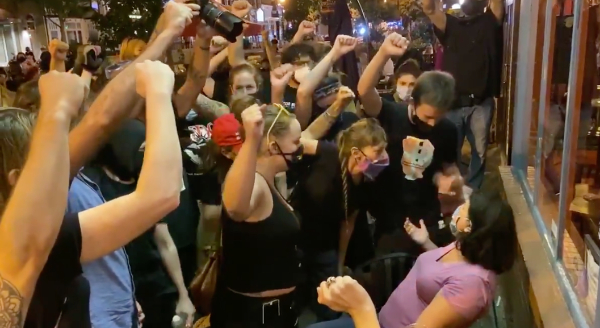|
Getting your Trinity Audio player ready...
|
By
Donations to the national organization for the Black Lives Matter (BLM) movement have seen a sharp decline amid several self-enrichment scandals and infighting.
Records viewed by The Epoch Times show that the fundraising arm of the organization, Black Lives Matter Global Network Foundation, raised just $9.3 million in the fiscal year ended in June 2022 compared to the $80 million or so the group raised in 2020, the year that George Floyd protests and riots rocked cities across America.
The documents were first obtained and reported on by The Washington Free Beacon.
The stunning 88 percent drop in donations comes amid controversy around the group’s financial accounting, allegations that organizers used donations to enrich themselves, and a lawsuit from BLM Grassroots that accused the head of BLM Global Network Foundation of stealing over $10 million.
BLM Global Network Foundation did not immediately respond to a request for comment.
The decline in donations comes as members of the BLM global foundation have been accused of using the organization’s funds on personal expenses, amid other scandals.
‘Personal Piggy Bank’
In September 2022, Shalomyah Bowers, head of BLM Global Network Foundation, was accused of stealing over $10 million in donations as “fees” for “on-the-ground work.”
Bowers was described in a criminal complaint filed by BLM Grassroots, a California-based nonprofit made up of BLM chapters across the country, as a “rogue administrator” and “middle man turned usurper” who used BLM Global Network Foundation as his “personal piggy bank.”
“While BLM leaders and movement workers were on the streets risking their lives, Mr. Bowers remained in his cushy offices devising a scheme of fraud and misrepresentation to break the implied-in-fact contract between donors and BLM,” the lawsuit states.
Bowers’s actions prompted the Internal Revenue Service (IRS) and a number of state attorney generals to lead multiple investigations into the financial accounts of BLM Global Network Foundation, according to the complaint, which said that the BLM movement suffered “irreparable harm” as a result of Bowers’s actions.
“As of the date of this lawsuit, Mr. Bowers continues to fraudulently raise money from unsuspecting donors passing himself off as the organization that is doing the work of BLM, padding his own pockets and that of his associates at the cost of BLM’s reputation,” the complaint states.
In a statement, a lawyer speaking on behalf of BLM Global Network Foundation called the allegations against Bowers “baseless” and “completely false” while releasing the results of an independent audit (pdf) to support its pushback.
“As shown in the independent audit, there has been no ‘siphoning of money’ by Shalomyah Bowers and Bowers Consulting Firm,” Byron McLain, counsel for BLM Global Network Foundation, stated, while portraying the organization under Bowers’s leadership as having “chartered a path of responsibility.”
Bowers was hired in 2020 by BLM co-founder Patrisse Cullors, a self-identified “trained Marxist” who stepped down from her role as executive director in 2021 following criticism over the group’s finances and reports of her purchasing four high-end homes for $3.2 million.
Around that time, the head of BLM Greater New York City, Hawk Newsome, called for an independent investigation to determine how BLM Global Network Foundation spends its money.
“If you go around calling yourself a socialist, you have to ask how much of her own personal money is going to charitable causes,” he told the New York Post. “It’s really sad because it makes people doubt the validity of the movement and overlook the fact that it’s the people that carry this movement.”
Also, the global BLM network foundation paid $840,000 to Cullors Protection LLC, a security firm owned by Cullors’s brother Paul Cullors.
The organization also sent almost $970,000 to Trap Heals, a cultural architecture firm founded by Damon Turner, who fathered Cullors’s child.
The two payments were revealed in a tax filing (pdf), known as a Form 990, which marked the first public financial disclosure the BLM Global Network Foundation provided since incorporating in 2017.
Most charitable organizations must file the form with the IRS annually to maintain their tax-exempt status. The foundation hadn’t been required to do so while under the fiscal sponsorship of a charity until December 2020, when it became an independent, 501(c)(3) nonprofit.
The tax filing showed that BLM had nearly $42 million in net assets as of June 30, 2021. It had about $80 million in revenue through grants, royalties, and other contributions. Roughly $26 million, or about a third of the amount, were dispensed to BLM chapters and organizations advancing BLM, transgender, and environmental causes.
Transparency Concerns
At the end of 2020, 10 local BLM chapters accused the global foundation of lacking accountability and failing to provide financial transparency.
Local chapters also complained of being walled off from meaningful participation in the national arm’s decision-making processes, including around the establishment of its political analysis and vision, and that they “have been consistently prevented from establishing financial transparency.”
“For years there has been inquiry regarding the financial operations of BLMGN and no acceptable process of either public or internal transparency about the unknown millions of dollars donated to BLMGN, which has certainly increased during this time of pandemic and rebellion,” they wrote.
Following the criticism, BLM Global Network Foundation set up a “Transparency Center” on its website, stating that the group was “embracing this moment as an opportunity for celebration, accountability, healing, truth-telling, and transparency.”
The group said that a key takeaway from its Form 990 tax filing and independent audit was that the organization is “financially sound” while its leaders “have been good stewards” of donations.
It also claimed that scrutiny about its finances from “right wing” media outlets were an attempt to “sow mistrust” in the group and that allegations of financial malfeasance are “racist.”





